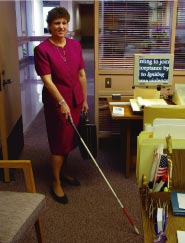
Rehabilitation
of Individuals Who Are Blind
or Have Vision Impairments
Orientation and Mobility (O&M)
Specialists and Rehabilitation Teachers provide essential services that
are designed to empower blind and visually impaired people to live and
travel independently. Successful practitioners are personable, creative,
and insightful to the viewpoints of others.
Orientation and Mobility Specialists work closely with people
who are blind or visually impaired to help them develop the skills necessary
for independent and safe travel. The use of the sighted guide technique,
the long cane, and electronic travel aids are some of the systematic techniques
by which blind or visually impaired people orient themselves to their
surroundings and move about safely and efficiently. Orientation and Mobility
Specialists also monitor and support the development of the basic concepts,
sensory skills and protective techniques for safe travel.
Daily professional activities of Orientation and Mobility Specialists
may include interviewing and making assessments and referrals as well
as providing direct, one-on-one orientation and mobility services. Some
opportunities are available in low-vision clinics for assessing vision
and determining training needs.
Rehabilitation Teachers perform a broad variety of activities
to teach independent living skills, activities of daily living, homemaking
skills, and personal management. They are the ones who teach blind and
visually impaired people how to read and write Braille, use assistive
technology to communicate, and perhaps hire and manage personal care assistants.
Activities of daily living are the routine acts we perform every day to
look after ourselves to be productive and enjoy life—telling time,
preparing meals, eating, dressing, grooming and personal hygiene. Rehabilitation
Teachers coach blind and visually impaired individuals in those areas
and in the use of technology such as computers, telephones, and Braillewriters.
.
Rehabilitation Teachers often work with vocational rehabilitation counselors
to evaluate and plan teaching activities to meet a client’s needs,
and with home health workers to make individual assessments. They sometimes
work with blind and visually impaired individuals in their homes and places
of work to set up their physical environments and adaptive equipment.
.
It takes a team of professionals from several fields to meet the needs
of people who are blind or have vision impairments. Orientation and Mobility
Specialists and Rehabilitation Teachers often work with allied health
professionals such as ophthalmologists, opticians, rehabilitation counselors,
special education teachers, low vision practitioners, and deaf-blind specialists.
It is important that these professionals understand each others’
roles and functions and the complementary nature of the rehabilitation
team.
Preparation.
The positions of Orientation and Mobility Specialist and Rehabilitation
Teacher typically require a bachelor's degree in rehabilitation or related
fields, with specialized training related to serving people who are blind
or visually impaired. A master's degree is usually preferred. Orientation
and Mobility Specialists hold a degree in rehabilitation or education
with an emphasis or major in Orientation and Mobility. The Association
of Educators and Rehabilitators of the Blind and Visually Impaired (AER)
must have approved the degree program.
Certification.
Graduates of approved university programs are eligible for certification
in Rehabilitation Teaching or in Orientation and Mobility from the Academy
for the Certification of Vision Rehabilitation and Education Professionals.
Opportunities.
Orientation and Mobility Specialists and Rehabilitation Teachers work
in public and private rehabilitation agencies, including state vocational
rehabilitation agencies for the blind and visually impaired, low vision
clinics, and educational institutions. Many professionals provide services
under contractual arrangements with agencies.
Find
out more about Vocational Rehabilitation
(Excerpts from the
Careers in Vocational Rehabilitation Booklet)
Who
makes a good rehabilitation professional?
Preparing for a Career in Vocational Rehabilitation
Questions about a Career in Vocational Rehabilitation
Vocational
Rehabilitation Professions:
Rehabilitation
Counseling
Rehabilitation Counselors
Rehabilitation of Individuals Who Are Blind
or Have Vision Impairments
Orientation and Mobility Specialists
Rehabilitation Teachers
Vocational Evaluation and Work Adjustment
Vocational Evaluators
Work Adjustment Specialists
Job Development and Placement Specialists
Rehabilitation of Individuals who are Deaf or Hard
of Hearing
Deafness Rehabilitation Professionals
Interpreters for Deaf Individuals
Undergraduate Education in the Rehabilitation
Services
Rehabilitation Practitioners
Rehabilitation Administration
Other Vocational Rehabilitation Professions
Rehabilitation Medicine, Physiatrists, Rehabilitation Nurses
Prosthetics & Orthotics
Rehabilitation Technologists
Rehabilitation Psychologist
Speech-Language Pathologists and Audiologists
